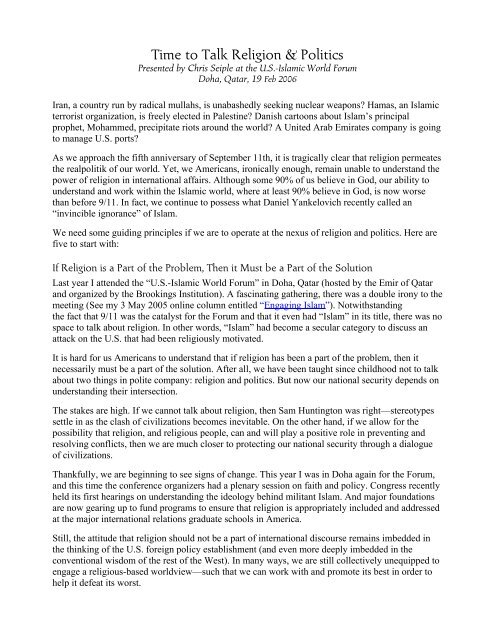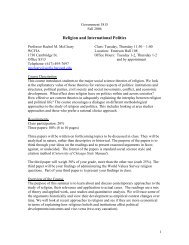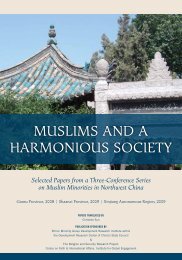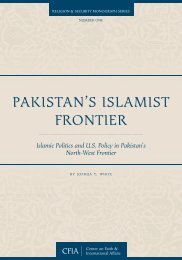Chris Seiple Doha Speech - The Institute for Global Engagement
Chris Seiple Doha Speech - The Institute for Global Engagement
Chris Seiple Doha Speech - The Institute for Global Engagement
You also want an ePaper? Increase the reach of your titles
YUMPU automatically turns print PDFs into web optimized ePapers that Google loves.
Give Religion its Legitimate Seat at the International Relations TableBecause it is so difficult to grasp the role that religion plays from a personal perspective, ouranalytic thinking suffers. Too many international relations experts worship at the wailing wall of“church-state separation”—often ignoring religion altogether—to their own detriment and thepeople they advise. A kind of secular “fundamentalism” in our government has prevented religionfrom having its legitimate seat at the table of international relations.In April 2003, be<strong>for</strong>e U.S. interagency teams went into Iraq to advise the various Iraqi ministries,there was debate about what to do with the “Ministry <strong>for</strong> Religion.” One official simply stated: “Wedon’t do religion.” As a result, when the leader of Iraq’s Shi’a majority issued a religious edict inJune 2003 regarding American plans <strong>for</strong> elections, it was ignored. By November, however,Ambassador Paul Bremer was called home <strong>for</strong> emergency consultations because the U.S. plan wasnot working. <strong>The</strong> American leaders had finally realized that they had to find a way to incorporatethe Shi’a leader and the 60 percent of the population that he represented.We must find a way to bring together people who operate at the intersection of religion andrealpolitik and invest in them. <strong>The</strong>se “bilingual” ambassadors exist; and we need them more thanever be<strong>for</strong>e.Only Good <strong>The</strong>ology Overcomes Bad <strong>The</strong>ologyOver the past four-plus years, we have responded to 9/11 in two ways. First, we have definedsecurity in a defensive manner, focusing on gates, guns and guards. Natural enough after suffering ahorrific attack, the explicit purpose has been keeping “them” out and “us” protected. Second, wehave asked ourselves why “they” hate us. Our response here has been to yell louder, over the wallswe have built, explaining why we are such good people—just ask us!<strong>The</strong> problem with this approach, however, is that it remains about us. We have made no sustainedef<strong>for</strong>t to understand “them.” If we cannot begin to grasp the general Muslim worldview—includingits historical and cultural manifestations in particular places around the world—then we will neverbe able to communicate.In order to communicate, we must understand that the Muslim worldview is inherently rooted in“theology.” (This is a <strong>Chris</strong>tian term, but I use it to communicate the simple idea that Muslims thinkabout and study God as much as <strong>Chris</strong>tians.) Islam is, of course, on the agenda of every securityexpert, but almost always in a way that is limited to the ideological dimensions of militant Islam. Ifwe treat it only as an ideology, we will continue to swat at symptomatic flies and not deal with thereal issues.We must understand the theology behind Islam if we are to appropriately come alongside thosegood Muslims who are battling <strong>for</strong> the soul of Islam. This is where the so-called “war of ideas” willbe won. For starters, we need anthropologists and theologians at the National Security Council, theState Department, and the Department of Defense.We’d Better Learn to Speak Abrahamic<strong>The</strong> children of Abraham have something in common: a God-based worldview. While there areobvious differences, some of them irreconcilable, this God-based worldview does include commonconcepts of Justice and Mercy. Moreover, this worldview’s bedrock belief that we are each made inthe image of our Creator provides a firm foundation <strong>for</strong> the concept of universal and equal humandignity. As a result, international experts who take their faith seriously are better able to discuss thecommon problem of militant Islam.
Americans, however, are not very good at communicating because we are unable to frame ourmessage in the context of such common principles as Justice and Mercy. We would rather talkabout “democracy and human rights,” which most people in Asia now see as mere rhetoricalwhitewash <strong>for</strong> continued American dominance, if not outright imperialism. In politics, perception isreality—whether we like it or not, whether it is correct or not—and this perception rages acrossAsia, especially in Muslim countries. We need to find ways of speaking and relating that are honestand transparent, but that avoid needlessly alienating Muslims.By way of an example, consider the <strong>Institute</strong> <strong>for</strong> <strong>Global</strong> <strong>Engagement</strong>’s current ef<strong>for</strong>ts in relationaldiplomacy in Pakistan’s Northwest Frontier Province. Two weeks ago, as the province was rockedby riots in protest of the Danish cartoons, the Chief Minister of the province hosted the first meetingof the Interfaith Advisory Council in his official residence. Over the last eight months IGE has beenworking carefully and in a principled way with the Chief Minister to find practical ways to promotejustice and mercy in NWFP by enabling educational and socio-economic opportunity <strong>for</strong> people ofall faiths in this geo-strategically important region.An ef<strong>for</strong>t like this is just one facet of a much larger engagement initiative that is urgently neededbetween the West and the Islamic world. Governments need to encourage and enable faith-leaders,and their institutions, to regularly participate in diplomacy (state-to-state); public diplomacy (stateto-society)and people-to-people diplomacy (society-to-society).Religious Freedom is CounterterrorismToo much tolerance can lead to terrorism. Consider Aum Shinryko in Japan, where, because of itsreligious cult status, it was constitutionally protected from investigation be<strong>for</strong>e its March 20, 1995saran gas attack on the Tokyo subways. We saw the same thing with last year’s “7/7” bombers inLondon, among whom was a <strong>for</strong>mer disciple of the non-violent extremist group, Hizb ut-Tahrir(HT). HT is banned in Germany, where they have historic experience with hate speech, but notbanned in the UK. <strong>The</strong>re is a fine line between tolerance and terrorism. Still, this is not the realissue.Tolerance is not good enough—we need respect. <strong>The</strong> Abrahamic faith traditions demand that wenot just tolerate our neighbors, but respect them. For those of us who are <strong>Chris</strong>tians, we are taughtthat everything hangs on two principles: loving God and loving our neighbors as ourselves. In otherwords, our identity is rooted in our respect <strong>for</strong> the other, which in turn is rooted in love.Civil Society is the balance between the “freedom to” something (liberty) and the “freedom from”something (security). <strong>The</strong> fulcrum will vary according to historical and cultural context, but the truetest of the civility of any society will always be how it respects the minority in its midst. <strong>The</strong> sacredtexts have something definitive to say here, and the Abrahamic adherents must re-claim the best oftheir faith, if they are to overcome the worst of religion.Put differently, all of us must work to find the pre-existing principles of respect within differentcultures, and build up traditions of religious freedom from there. Our national security depends onit, and the best of our faith demands it.





